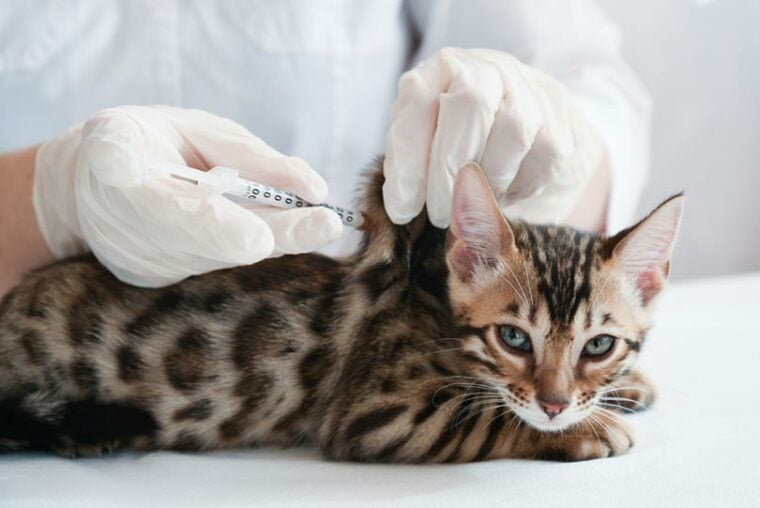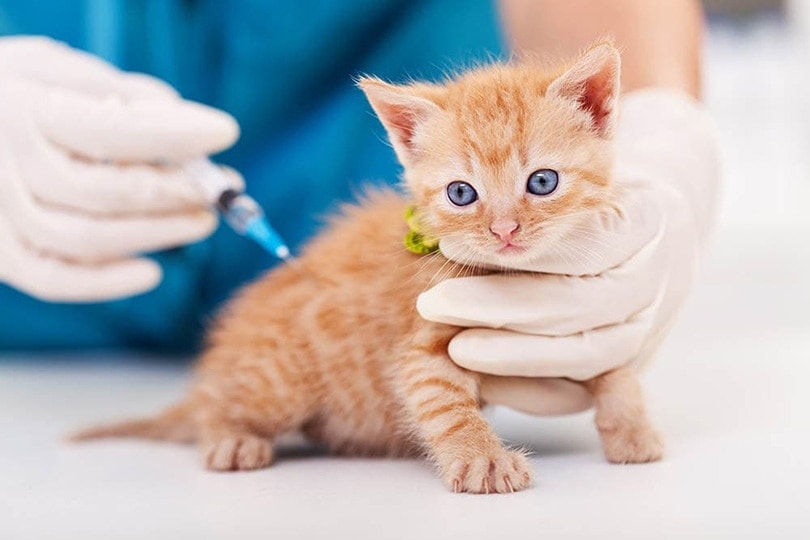
Vaccinations are incredibly important for your kitten, and it might feel like there are several condensed into a very short period. The types they might get are separated into core or non-core vaccinations, which means vaccinations all kittens should get and others that depend on their lifestyle; an outdoor cat will need a different type of protection than an indoor one. So, how many vaccinations should you expect, and what do they protect against? Let’s take a closer look!
What Vaccinations Does a Kitten Need and Why?
Vaccinations start when your kitten is 6 to 8 weeks old and are repeated every 3 to 4 weeks until they’re around 4 months old.1 The first two vaccinations on our list should be given to every kitten,2 and veterinarians recommend the third.

1. FVRCP
Kittens must be protected from common diseases in the cat population, such as feline viral rhinotracheitis, feline calicivirus, and feline panleukopenia (FVRCP). This is generally administered as a combination vaccine.
While many cats can begin their vaccination schedule at 6 weeks old, some vets might recommend starting at 8 weeks. Boosters at 12 and 16 weeks will follow this schedule.
2. Rabies
Rabies can affect not only cats but also other animals and humans, and on top of that, it’s also fatal. Your kitten can get a rabies vaccination as early as 12 weeks, but this will depend on your vet and state laws.

3. FeLV
The American Animal Hospital Association (AAHA), lists FeLV as a core vaccination for kittens and young adult cats less than one year of age. This is due to their age related susceptibility to FeLV. It is considered a non-core vaccination for low risk adult cats over one year of age. FeLV is transmitted by close contact with an infected cat and can be transferred from an infected mother cat to her kittens, either before they were born or while nursing.
Your veterinarian will discuss the FeLV vaccination with you based on your pet’s lifestyle and history. The vaccination can occur when the kitten is 8 to 12 weeks old, and a booster will be given 3 to 4 weeks later.
 Kitten Vaccine Schedule
Kitten Vaccine Schedule
There might be differences in this schedule, depending on your specific circumstances, but this is an example of a typical kitten vaccine schedule, according to PetMD:3
| Age | Vaccination Type |
| 6–8 weeks | FVRCP (required)
FeLV (highly recommended) |
| 10–12 weeks | FVRCP (second in series)
FeLV (highly recommended) |
| 14–16 weeks | FVRCP (third in series)
Rabies (required by law) FeLV (highly recommended) |
| 1 year | FVRCP (booster required)
Rabies (booster required by law) |
Why Does a Kitten Get More Than One Vaccine?
You might be wondering why your kitten needs so many vaccinations and maybe why they don’t receive vaccinations straight away. Surely, your cat is vulnerable to diseases before 6-8 weeks of age, so why do they only start getting vaccinations then?
The answer lies with the mother cat. A kitten receives temporary immunity through their mother’s milk after birth, much like a breastfed human infant. This milk is known as colostrum, and it’s packed with protective antibodies.
This passive immunity will protect your kitten for the first few weeks of life. However, for your kitten to remain protected, they will need active immunity, so they will need to produce their own protection against these diseases.
Producing an Active Immunity
Although vaccines stimulate active immunity, they need to be administered at the right time. If given too early, the mother’s antibodies will still be in the kitten’s system, preventing the kitten’s body from responding effectively to the vaccine. This means it’s difficult to know exactly when the right time is, so a series of vaccinations are given in intervals.
The aim is for the kitten to receive at least two vaccinations after they’ve lost their mother’s immunity but before they’re exposed to an infectious disease. A single vaccination will also not stimulate long-term active immunity, which is why multiple injections are administered. The rabies injection is an exception to this rule, as one is enough at the appropriate age to produce active, lasting immunity.
Vaccines will then be repeated every one to three years to ensure your cat’s immunity is kept up throughout adulthood, depending on the vaccine and circumstances.

Side Effects From Vaccinations
When you take your kitten in for their vaccine, your vet might discuss possible side effects to be aware of. Mostly, side effects are mild, but very rarely, you might notice something more severe.
It’s important to note that if you notice any of these rare severe side effects, you should contact an emergency vet immediately. And if you’re concerned about your kitten during their vaccination journey, check in with your vet. They can ensure it’s safe for your kitten to continue their treatment and might even prescribe an antihistamine before their shots are due.
Final Thoughts
Vaccinations are crucial for the health and well-being of your kitten. It’s essential to monitor your kitten and contact your vet if you’re ever concerned about them. Their shots are separated into core and non-core vaccinations, which means some are recommended for all cats, while others will be determined by lifestyle. Vaccinations will set them up for a long, healthy life as part of your family!
Featured Image Credit: Dina da, Shutterstock








